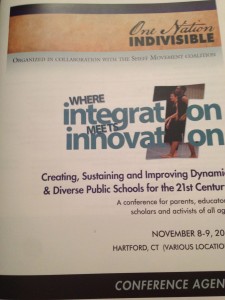Cities, Suburbs, Schools
11/9/13
Last Friday, November 8, I was able to attend a conference titled Where Integration Meets Innovation. This conference was held at the Hartford Public Library and its main purpose was to aid in the Sheff Movement Coalition. The conference had a very reputable panel with representatives such as Martha Stone, Dennis Parker, Amy Wells, Alex Knopp, Robert Cotto, and Elizabeth Horton Sheff herself.
At first I was not sure how the conference would work. I was very nervous that I would be asked questions and I had never been to anything quite like it. The group of students who attended decided to split the conference up into sections by speakers. I chose to represent Martha Stone. Martha Stone is the lead attorney for the Plantiffs in the Sheff vs. O’Neill court case. We have been studying this case for some time in class and it was truly an experience to see the actual brains behind the ideas. Stone began her panel discussion by opening with two dates. She said “April 27, 1989 and July 9, 1996”. She proceeded to speak about how the lawsuit began twenty-four years ago and the decision was seventeen years ago. She said they always begin each topic with Langston Hughes’s differed dream quote. “What happens to a dream deferred? Does it dry up like a raisin in the sun? Or fester like a sore– And then run? Does it stink like rotten meat? Or crust and sugar over– like a syrupy sweet? Maybe it just sags like a heavy load. Or does it explode?” This quote was meant to show everyone that everybody deserves an equal chance at dreaming. She then spoke about how in 1987 civil rights advocates approached her and how this was before Elizabeth Horton Sheff was even involved. At first Hartford made it very clear that they did not want this lawsuit in any way shape or form.

Stone started to explain the exact reasoning for the lawsuit. She said in 1987 and 1989 mastery tests were administered. Hartford kids scored significantly lower than other Connecticut kids. This was the first time that the difference in educational quality became very clear. Over seventy-five percent of the children in Hartford needed extra help with basic reading. This was a number Stone felt was absurd.
Finally Stone ended with a saying that I really thought was powerful. She asked if the glass was half empty or if the glass was half full. She said the answer was yes. Stone followed by saying until the glass is all-full the law suit will continue. There is no equal education in isolation. This conference provided the community with a lot of information both facts based and hopeful wishes. Sheff and Stone intend to make it equal for all kids to achieve their dreams. I was honored to be apart of the conference and the Hartford Public Library provided a beautiful space for a truly inspirational conference aimed for parents, educators, scholars, and activists.